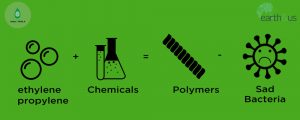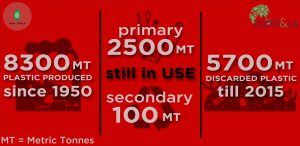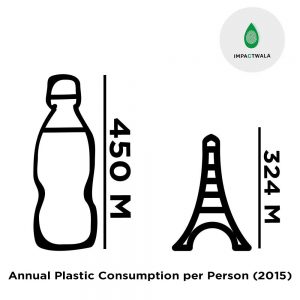PlasticWala: The Quantum
Plastic. Who can escape the ever expanding tentacles of this demon? It’s everywhere around us and aren’t we all just tired of listening to the same old voice asking us to stop using plastic? We are so tired that we’ve become ignorant. We have shut our eyes hoping that on the day we open them, all the plastic will be gone. Well, if that’s what you are thinking, we are all doomed. That pile of plastic waste in your backyard is only going to increase and increase like no one ever imagined!
The science behind plastic waste
Approximately, 84.5 million barrels of oil are used just to make raw materials for plastic production every day! Plastic is made using fossil fuels which are in form of monomers such as ethylene and . A chains of monomers are made to make polymers, and mixed with chemicals to enhance their properties. These polymers are heavy molecules which are very difficult to break down organically. Thus, they keep on accumulating in the environment for extensive periods of time!

The Quantum
The mass production of plastic has increased from 2 million tonnes in 1950 to 380 million tonnes in 2015. To put this into perspective, Burj Khalifa – the tallest building in the world- when unoccupied, weighs 0.5 million tonnes. We have made around 8,300 million tonnes of different kinds of plastic since production started which is equivalent to weight of 16,600 Burj Khalifas of plastic! It’s crazy, isn’t it?
To add to the numbers, only 2600 million tonnes (31%) of the produced plastic is in use currently and 5700 million tonnes (69 %) has been discarded or incinerated. So we produce vast quantities of plastic over a period of time only to realise that we threw away most of it! Also, in the meantime, it is slowly killing us and our planet and yet, we don’t seem to care!

The global average for plastic consumption in 2015 was 45 kg per person annually. Now, 45 kg of plastic is equivalent to 2,250 half litre plastic coke bottles. If stacked on top of each other, this will reach a height of 450 meters! This is 100 meters higher than the Eiffel tower! A plastic bottle takes an average of 450 years to biodegrade. Each plastic bottle cap can form thousands of microplastics that is responsible for polluting drinking water and the food chain.

Most of the plastic products we use these days are single time or short term use. Plastic bottles, sanitary pads, baby diapers, food packaging and a million other plastic utilities are used just once and discarded away! We think that when we throw them out in the bin, they get recycled and our role ends there!
Recycling doesn’t necessarily mean that it stays out of the waste cycle. As a matter of fact, of all the plastic ever made, only 600 million tonnes (7.2%) has been recycled! Moreover, not all the recycled waste is actually reusable! Out of the 600 million tonnes of this recycled waste, only 100 million tonnes (1.2%) amounts to secondary use plastic and 100 million tonnes stays in the waste loop. The rest which amounts to 400 million tonnes ultimately gets discarded.
The trends of plastic waste generated indicate that it will reach 25,000 million tonnes by 2050! 9000 million tonnes will be recycled and the rest incinerated or discarded into landfills or the environment.
Conclusion
The quantum of plastic that is building in our environment is going to lead to an environmental collapse one day or the other. The onus of acting on it rests on our shoulder. We can either talk about it as much as we want or actually act on it in our own small ways! The first and the most strategic step would be to refuse using and carelessly disposing single use plastic! Once we have honoured the fundamental step towards sustainability, there exists abundant scope to move forward from thereon!
#PlasticWala is an attempt to draw our readers towards the larger issue of plastic consumption and waste generation! It comprises a series of articles on the various factors of the problem and seeks to address them justifiably! We invite our readers and supporters to contribute by writing personal perspectives and experiences that they face or have faced! Write to us at info@earthandus.org and check out the Impactwala page!
For more information read: “Production, use, and fate of all plastics ever made”
Written by: Mohit Arora and Allen Francis



